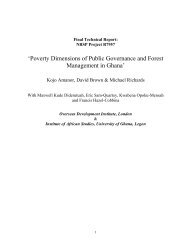The Gambian Tourist Value Chain and Prospects for Pro-Poor Tourism
The Gambian Tourist Value Chain and Prospects for Pro-Poor Tourism
The Gambian Tourist Value Chain and Prospects for Pro-Poor Tourism
You also want an ePaper? Increase the reach of your titles
YUMPU automatically turns print PDFs into web optimized ePapers that Google loves.
<strong>Tourism</strong> in <strong>The</strong> Gambia: International ‘Best Practice’ in Poverty Reduction & <strong>Pro</strong>-<strong>Poor</strong> Growth Through <strong>Tourism</strong><br />
Draft Report (Friday 22 nd December 2006)<br />
sector through ASSET demonstrates an open <strong>and</strong> transparent interaction, allowing its<br />
members to self-regulate, gain access to resources, such as training, <strong>and</strong> should not be seen<br />
as a threat, but rather as a positive interaction vital to maintaining the high level of out-ofpocket<br />
expenditure seen in <strong>The</strong> Gambia.<br />
Box 10: <strong>Pro</strong>-<strong>Poor</strong> <strong>Tourism</strong> Regulatory Issue # 9<br />
GTA should, within the existing licensing <strong>and</strong> HRD framework, consider ways to further<br />
support the in<strong>for</strong>mal retail sector <strong>and</strong> encourage excellence in order to defend this important<br />
flow of resources from tourist expenditure to the poor.<br />
Visitor surveys indicate two clear, <strong>and</strong> contradictory, messages relating to tourist<br />
interaction with <strong>Gambian</strong> people. First, the friendliness of the <strong>Gambian</strong> people is<br />
consistently ranked as one of the key attractions of the destination. Second, hassle from<br />
‘bumsters’ is considered a serious problem by about two-thirds of departing tourists.<br />
Regulations seeking to reduce the hassling of tourists are extremely tough with instances of<br />
suspected bumsters being held at army camps <strong>for</strong> up to 72 hours without charge. <strong>Tourist</strong>s<br />
still complain of hassle from ‘bumsters’, which suggests that either the existing regulations<br />
are not being implemented or they are <strong>and</strong> have proved ineffective. Either way, the danger<br />
of enacting increasingly rigorous anti-hassle legislation is that one of the unique selling<br />
features of <strong>Gambian</strong> tourism – the easy-going interaction <strong>and</strong> trade with local people – will<br />
be lost.<br />
5.4 Excursions <strong>and</strong> local Transportation<br />
Excursions are a potentially powerful mechanism <strong>for</strong> linking the tourism sector to the poor.<br />
Spending on excursions in <strong>The</strong> Gambia was about £4.5m (D255m) in 2005. Although this only<br />
represents one twentieth of the total tourism economy it is important because it is takes<br />
place at the destination <strong>and</strong> has significant links with the poor – with an estimated 25% of<br />
all excursion expenditure being in the in<strong>for</strong>mal sector 33 .<br />
Local transportation represents only about 1.5% of the tourism economy, £1.3m (D75m). It<br />
comprises two elements, a small car hire component – which has little pro-poor impact –<br />
<strong>and</strong> taxis, where it is assumed that 50% of the gross local transportation revenue accrues to<br />
taxi drivers – some 43% of total turnover in this activity.<br />
<strong>Tourist</strong> taxi – quality of vehicles needs to be addressed © Jonathan Mitchell<br />
33 Bah, A <strong>and</strong> Goodwin, H (2003) Improving access <strong>for</strong> the in<strong>for</strong>mal sector to tourism in <strong>The</strong> Gambia <strong>Pro</strong>-<br />
<strong>Poor</strong> <strong>Tourism</strong> Working Paper No.15<br />
40

















